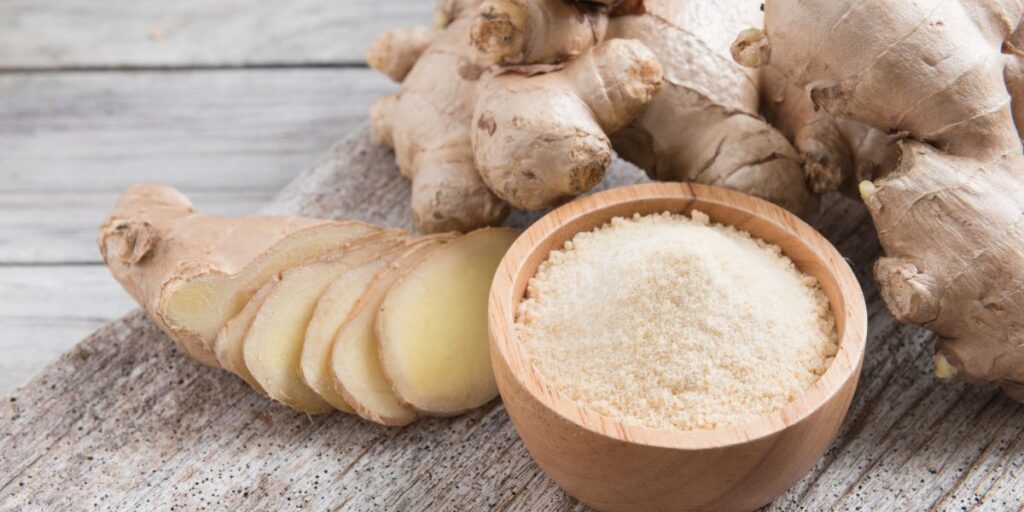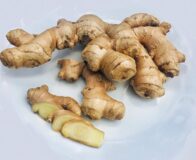Exploring the Health Benefits of Ginger for Cough, Sore Throat, and Digestive Issues

Ginger has been valued for its cooking and healing benefits for centuries. This widely used spice is known for its strong aroma and warm, pungent taste. Despite its humble appearance, ginger offers endless health benefits, making it a valuable inclusion in your diet and natural wellness regimen.
Looking for additional natural remedies for digestive issues? Check out our blog post on Meadowsweet: The Ultimate Herbal Remedy You Need to Try
As Amazon associates, we earn from qualifying purchases.
1. Benefits of Ginger: Taming Nausea and Vomiting
If you’re struggling with motion sickness, morning sickness, or the undesirable consequences of chemotherapy, ginger can come to your rescue and provide relief. Thanks to its active compound, gingerol, it acts as a powerful anti-nausea agent, calming your stomach and easing discomfort. Studies suggest ginger is particularly effective in reducing nausea and vomiting in pregnant women and individuals undergoing chemotherapy.
2. Combating Inflammation: Ginger’s Anti-inflammatory Powerhouse
Ginger fights nausea and has strong anti-inflammatory properties. Its unique properties can reduce inflammation, relieving arthritis, muscle soreness, and headaches. Research suggests ginger may be as effective as certain medications in managing chronic pain.
3. Ginger: A Friend to Your Digestive System
Ginger is a valuable digestive aid, stimulating the production of saliva and digestive enzymes, which helps break down food more efficiently. This can help with stomach problems like bloating, gas, heartburn, constipation, and diarrhea. Ginger may also prove beneficial in managing irritable bowel syndrome (IBS) by reducing symptoms like cramps and discomfort.
4. Benefits of Ginger for Immunity
Ginger may play a role in strengthening your immune system, making you less susceptible to common illnesses like the flu. Studies suggest it may increase the activity of white blood cells, your body’s natural defense against infection.
5. Ginger and Blood Sugar Regulation
Emerging evidence suggests ginger may offer benefits for individuals with diabetes or prediabetes. It may help regulate blood sugar levels and improve insulin sensitivity, potentially aiding in managing the condition.
Beyond the Surface
This blog has only scratched the surface of ginger’s potential health benefits as a natural remedy. Research continues to explore its impact on various other health concerns, including its use as a natural remedy for ailments such as colds, nausea, arthritis, migraines, and hypertension.
Ginger has been used for thousands of years to treat numerous ailments and its medicinal, chemical, and pharmacological properties have been extensively reviewed[1][2].
Ginger is known for its antioxidant properties, anti-inflammatory effects, and potential as an anticancer agent, making it a valuable natural remedy[3].
Ginger is considered safe for most people to consume in normal amounts found in food and recipes, but caution is advised with higher doses such as supplements due to potential risks like increased bleeding[2].
- Diabetic neuropathy: Ginger may help reduce pain and improve nerve function in individuals with diabetic neuropathy.
- Cholesterol management: Studies suggest ginger may help lower harmful LDL cholesterol and triglycerides while increasing beneficial HDL cholesterol.
- Cardiovascular health: Ginger’s anti-inflammatory properties may contribute to overall cardiovascular health.
- Liver protection: Ginger may offer protective benefits against liver damage caused by toxins or certain medications.
- Kidney function: Preliminary research suggests ginger may help protect against kidney disease.
How to Ingest Ginger for Nausea Relief
This section discusses several easy and effective ways to consume ginger to relieve nausea resulting from motion sickness, morning sickness, or chemotherapy.
- Ginger Tea: Steep fresh ginger slices in hot water to make a soothing ginger tea. You can add honey or lemon for flavor.
- Ginger Chews or Candies: Opt for ginger chews or candies that are convenient to carry and can be consumed easily when experiencing nausea.
- Ginger Smoothies: Blend fresh ginger with fruits like banana and pineapple to create a refreshing and nutritious smoothie.
- Ginger Capsules: Consider taking ginger supplements in capsule form, especially for chemotherapy-induced nausea, following medical advice.
- Ginger Infused Water: Add sliced ginger to a pitcher of water and let it infuse overnight for a refreshing drink to help settle your stomach.
These ingestion methods can provide the benefits of ginger in alleviating nausea associated with motion sickness, morning sickness, or chemotherapy[1][2][3][4].
Important Note:
While ginger is generally safe for most individuals, it’s always recommended to consult your healthcare provider before incorporating it into your routine, especially if you have any existing health conditions or are taking medications.
Conclusion
Ginger is more than just a flavorful spice. It’s a versatile natural remedy with a multitude of potential health benefits. From easing nausea and inflammation to supporting digestion and potentially boosting immunity, ginger deserves a place in your wellness arsenal. So, why not explore the diverse ways this powerful root can enhance your health and well-being?
Related Posts
Disclaimer: The content provided on this website, including all text, images, and other material, is for informational purposes only and is not intended to be a substitute for professional medical advice, diagnosis, or treatment. While we strive to share knowledge and information based on research, traditions, and personal experiences about natural remedies, readers are encouraged to confirm the information with other reliable sources and consult a qualified healthcare professional before making any health decisions or starting any new treatment. The use of any information provided on this site is solely at your own risk.
We do not claim to diagnose, treat, cure, or prevent any disease or health condition with the information provided. Always seek the advice of your physician or another qualified health provider with any questions you may have regarding a medical condition. Never disregard professional medical advice or delay seeking it because of something you have read on this website.
The owners and contributors of this website accept no liability or responsibility for any inaccuracies, errors, or misinterpretations of the content herein or for any loss, harm, or damage that may arise from accessing or using information on this site.
Citations:
[1] https://pubmed.ncbi.nlm.nih.gov/2062873/
[2] https://healthy.kaiserpermanente.org/health-wellness/health-encyclopedia/he.ginger-for-morning-sickness.tn9125
[3] https://www.ncbi.nlm.nih.gov/pmc/articles/PMC3703071/
[4] https://pubmed.ncbi.nlm.nih.gov/3277342/


